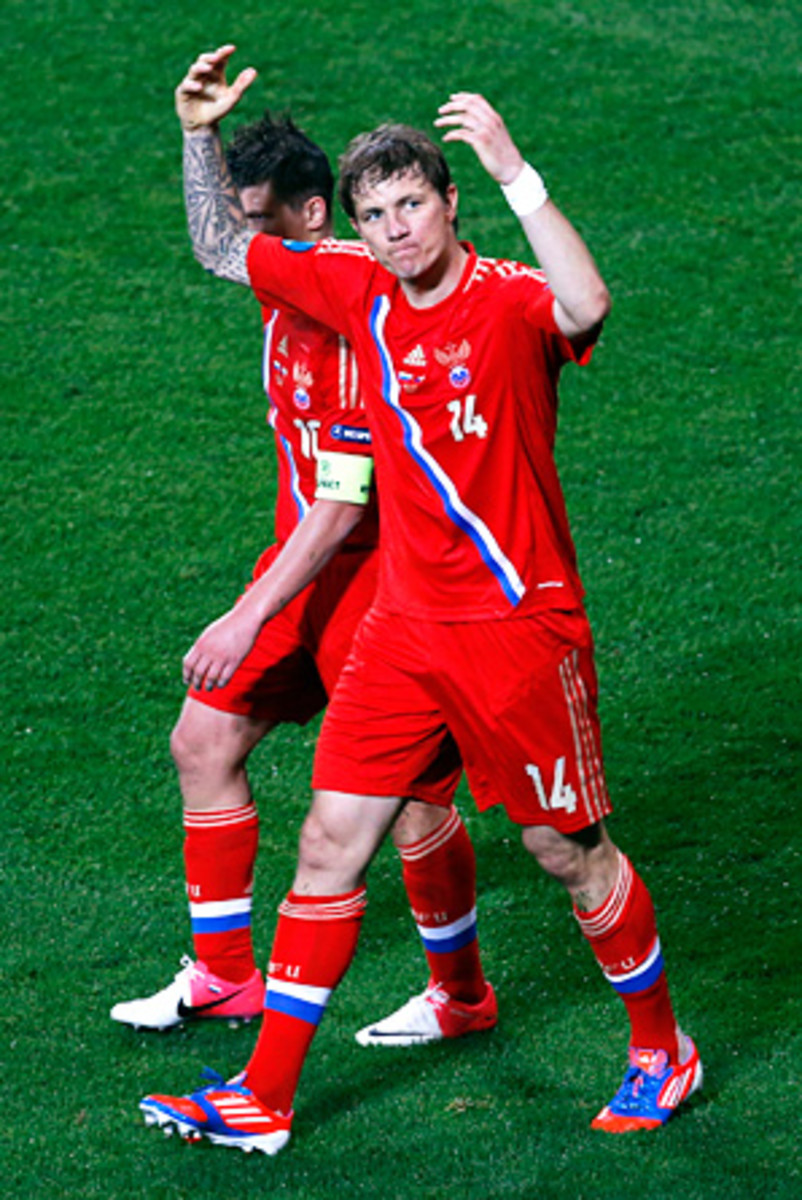Three thoughts from Russia's 4-1 victory over the Czech Republic
Here are three thoughts on Russia's 4-1 victory over Czech Republic in Group A of Euro 2012.
1. Russia is excitingly fluid. The potential was always there. This is a Russian side that has been together for a long time. All of the starting XI apart from Alan Dzagoev either played at Euro 2008 or would have played if not for injury or withdrawal. Six of the starting outfielders also play for Zenit St Petersburg, providing Russia with a greater mutual understanding than just about any side at the European Championship. On Friday, that chemistry paid off: With Aleksandr Kerzhakov's natural inclination to drop deep and operate almost as a false nine, Andrei Arshavin and Dzagoev's cutting in from the flanks and Aleksandr Anyukov and Yuri Zhirkov overlapping from full back, Russia was superbly fluent.
This team has shown flickers of great potential, most notably in last Friday's 3-0 win over Italy and in its 3-2 win over Ireland in Dublin in October 2010. But it's a different matter to put on such a dominant display when it matters. Despite some pleasing passing from the Czechs, Russia seemed firmly in control of the match from the opening minutes.
First there was Dzagoev, striding forward and laying the ball for Konstantin Zyryanov, who crossed. Kerzhakov hit the post, but the ball fell for Dzagoev to smash home: 1-0. Then there was Roman Shrirokov, who stabbed the second over Petr Cech after Arshavin's through-ball eluded Kerzhakov: 2-0. The Czechs looked comfortable when in possession of the ball, but they were woefully open in the back. Kerzhakov clipped the top of the bar on a square pass from Arshavin and the scoring opportunities continued from there, culminating in Dzagoev's second score and a brilliant goal by Pavlyuchenko. Russia coach Dick Advocaat must be very pleased, though he'll want to eliminate his team's vulnerability in the back.
2. The Czech Republic can still qualify. Russia's vibrancy made the Czechs look ordinary at times -- and defensively they were poor -- but the Czech Republic was good on the ball in terms of pure quality. It was the suspension of Tomas Hubschman that prompted Czech coach Michel Bilek to use a more fluid, attacking approach, one fueled by Jaroslav Plasil and Petr Jiracek in the holding roles. The upside of that strategy shined through in two aesthetically pleasing, dominant displays against Montenegro, but the downside was exposed by Russia -- Czech lacks a bit in the back of its midfield. There was also a feeling that, tidy as it was with possession, the team was without a goal-scoring threat. Milan Baros as the leader of the line doesn't exactly inspire confidence.
But the Czech Republic should not be despondent. It won't meet many sides who play with Russia's attacking verve, and in a way, it was unlucky to catch Russia playing so well. Hubschmann could return to add solidarity -- he came on for Jan Rezek at halftime -- or Bilek may decide that he doesn't need the attacking approach against Greece and Poland. Either way, the draw from Poland and Greece should give the Czechs encouragement: If it can get four points from its next two games, it still remains likely to go through.
Of course, to do that though will take a better performance from Petr Cech, who was slow off his line for Shirokov's goal and had his hands bent back by the third and fourth. Czech will also require a more committed defensive showing.The way that Tomas Sivok turned away from Pavlyuchenko's drive for the fourth Russian goal was typical of a sloppy all-round display from the back four.
3. Andrei Arshavin can still be a great player. He was derided towards the end of his tenure at Arsenal, but the Russian captain remains a player of great charm and wit, both on the field and off. On Friday, he was at his best: making darting runs with impish flicks, playing football with the imagination and sense of timing of a playwright and applying a punch when it was needed most.
In part, his resurgence has to do with his return to Zenit St Petersburg on loan, a credit to the rekindling of his great partnership with Kerzhakov. That duo played together at Zenit until Kerzhakov moved to Sevilla in 2006 -- he has since returned -- and it may have been better for both if they had never left. They simply seem to get the best out of each other, understanding each other's game as only those who have played together for protracted periods can. Together they tore Macedonia apart in a qualifier for Euro 2008, and there is something wonderful about seeing the affair rekindled. Arshavin's disguised ball to Kerzhakov midway through the second half, flipped with the outside of his right foot, was magical -- one of those moments of vision and skill that seem to exist outside the hurly-burly nature of the game. For his sake, let's hope Arshavin stays at Zenit. That's clearly where he is happiest, and it would seem horribly cruel to break up his partnership with Kerzhakov.






